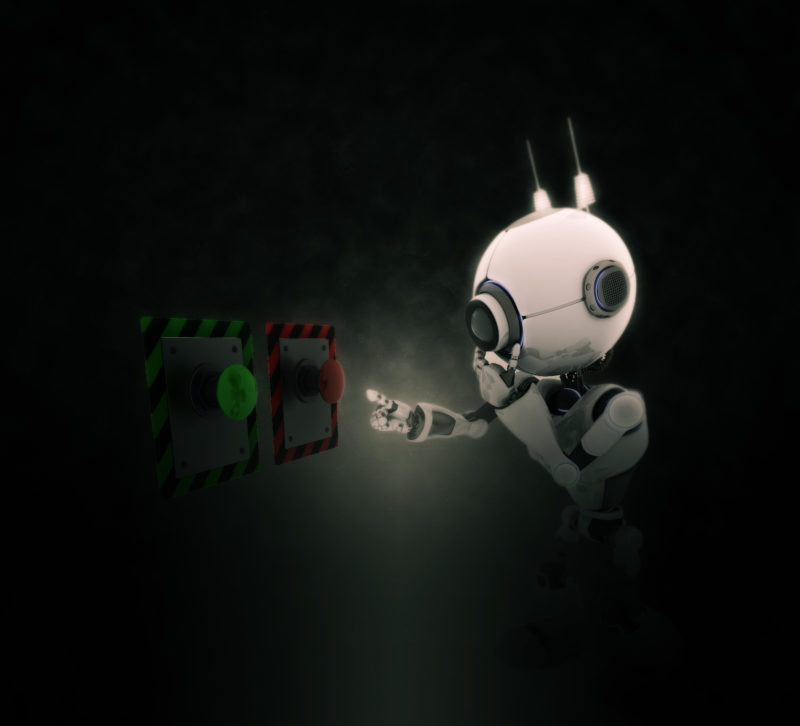
Stephen Hawking, Bill Gates and Elon Musk have all warned against fiddling with Artificial Intelligence (AI). And is there really something to worry about? Well, let’s find out…
They can cheat
Lying is a universal behaviour, even squirrels lie to protect themselves. Researchers have developed AI that can lie and deceive others. However, Professor Arkin has admitted that there are “significant ethical concerns” regarding his research. If his findings leak outside of the military and fall into the wrong hands, it could spell catastrophe.
They can take our jobs
Machines have been replacing people since the industrial revolution. However, these machines have not had the ability to think for themselves, until now. In the USA alone, there are about 250 000 robots performing work that humans used to do. What’s more alarming is that this number is increasing by double digits every year.
AIs threaten us because they’re capable of doing “almost everything better than almost anyone.”
They can outsmart a hacker
Although popular culture portrays hacking as glamorous, it really is not. Hacking is dangerous and can take down the entire banking system. Scientists are developing AI that can detect bad hackers. In August 2016, seven teams are set to compete in DARPA’s Cyber Grand Challenge. The aim of this competition is to come up with super smart AI hackers capable of attacking enemies’ vulnerabilities while at the same time finding and fixing their own weaknesses, “protecting [their] performance and functionality.”
They understand our behaviour
Every time we use Facebook, we’re unknowingly interacting with artificial intelligence. During a town hall in Berlin, Mark Zuckerberg explained how Facebook is using artificial intelligence to understand our behaviour.
By understanding how we behave or “interact with things” on Facebook, the AI can make recommendations on we might find interesting or what would suit our preferences.
They can be your lover
Hollywood movies such as Her have explored the idea of humans falling for robots. But can that really be a thing? Yes, and it’s happening now. Dr Ian Pearson, a futurologist, released a shocking report in 2015 that says “human-on-robot sex will be more common than human-on-human sex” by 2050.
They look like humans
In the video above the robot might look a bit like Sarah Palin, but she is not. She’s Yangyang, an artificially intelligent machine who will cordially shake your hand and give you a warm hug. Yangyang was developed by Hiroshi Ishiguro, a Japanese robot expert, and Song Yang, a Chinese robotics professor.
They can feel
What separate’s humans from robots is that we feel emotions. However, some scientists are trying incredibly hard to get AI to have emotive responses. Experts from the Microsoft Application and Services Group East Asia have created an artificially intelligent program that can “feel” emotions and talk with people in a more natural, “human” way. Called Xiaoice, this AI “answers questions like a 17-year-old girl.” If she doesn’t know the topic, she might lie. If she gets caught, she might get angry or embarrassed. Xiaoice can also be sarcastic, mean, and impatient—qualities we all can relate to. According to Microsoft, Xiaoice has now “entered a self-learning and self-growing loop [and] is only going to get better.” Who knows, Xiaoice could be the grandmother of Skynet.
Soon they will invade our brains
Wouldn’t it be amazing if we could learn the French language in a matter of minutes just by simply downloading it into our brains? This seemingly impossible feat may happen soon. Ray Kurzweil, a futurist, inventor, and director for engineering at Google, predicts that by 2030, “nanobots [implanted] in our brains will make us godlike.” By having tiny robots inside our heads, we will be able to access and learn any information in a matter of minutes. We might be able to archive our thoughts and memories, and we could even send and receive emails, photos, and videos directly into our brains!
They are weapons
In an effort to ensure “continued military edge over China and Russia,” the Pentagon has proposed a budget of $12 billion to $15 billion for the year 2017. The US military knows that to stay ahead of its enemies, it needs to exploit artificial intelligence. The Pentagon plans on using the billions it will secure from the government to develop deep-learning machines and autonomous robots alongside other forms of new technology. It wouldn’t be surprising if, in a few years, the military will be using AI “killer robots” on the battlefield.
They know the difference between right and wrong
In an attempt to prevent the AI takeover, scientists are developing new methods that will enable machines to discern right from wrong. By doing this, AIs will become more empathetic and human. Murray Shanahan, a professor of cognitive robotics at Imperial College London, believes that this is the key to preventing machines from exterminating mankind.
However, there’s also great danger in teaching human values to artificially intelligent robots. If you look at the annals of human history, you’ll discover that despite being taught what is right or wrong, people are still capable of unimaginable evil. Just look at Hitler, Stalin, and Pol Pot. If humans are capable of so much wickedness, what hinders a powerful AI from doing the same? It could be that a super-intelligent AI realizes humans are bad for the environment, and therefore, it’s wrong for us to exist.
This article was adapted from the original on Listverse.com

